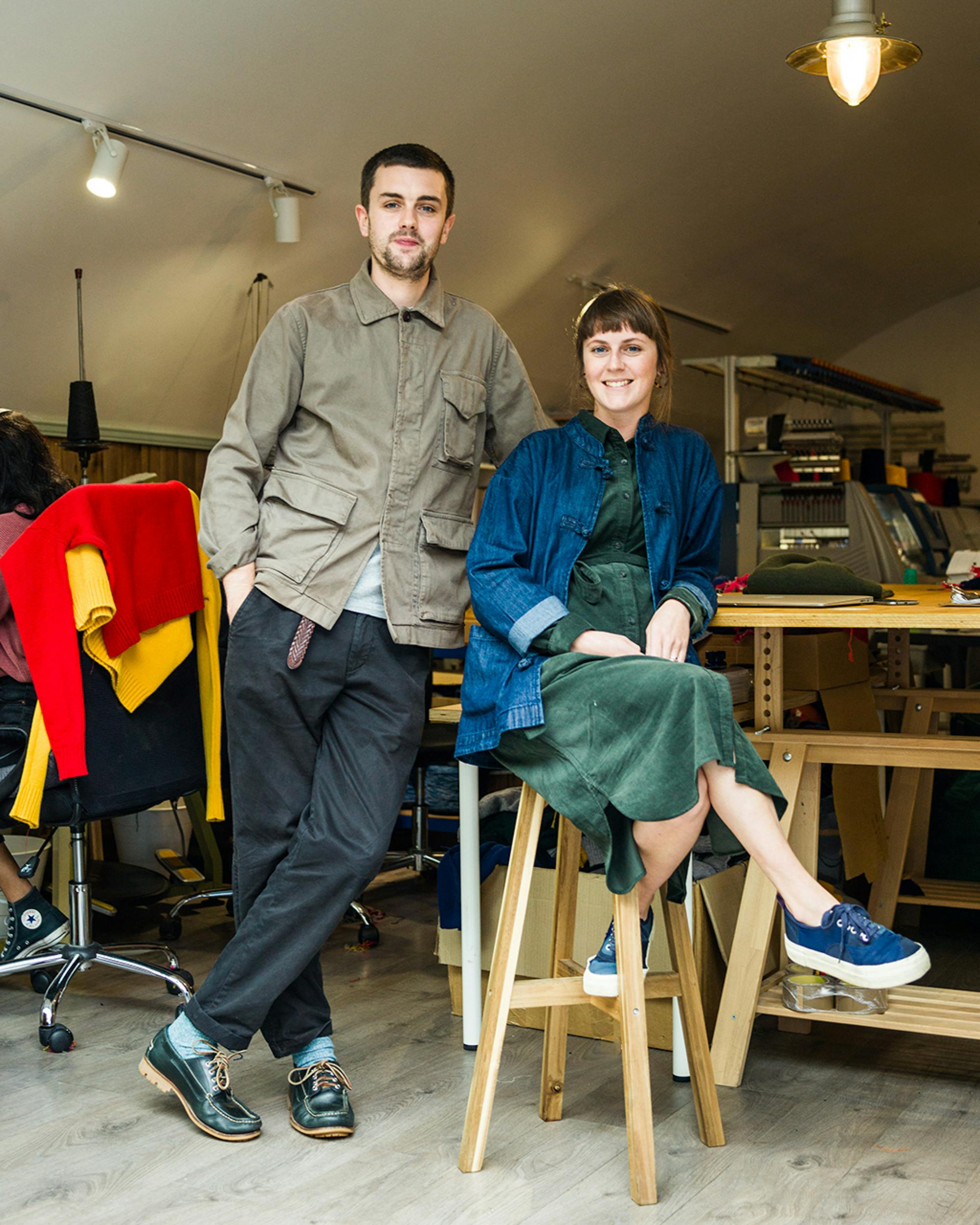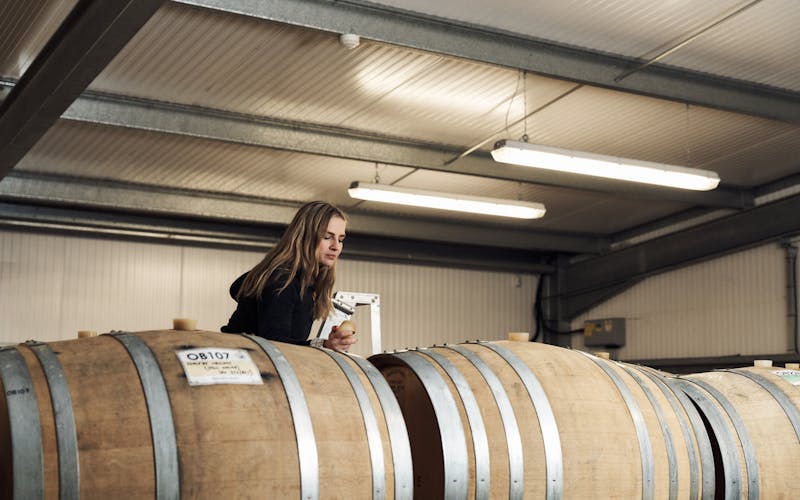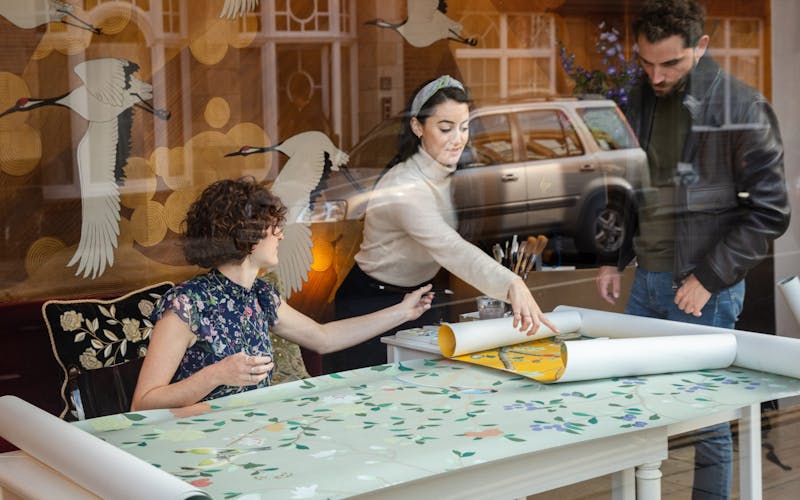

for Walpole members and
non-members available now
at The Londoner



Walpole’s star columnist Peter Howarth returns with his latest ‘long read’, in which he discusses why the ‘restless, committed, energetic’ drive of Salvatore Ferragamo, Giorgio Armani and Sir Paul Smith is alive and well in the new generation of luxury leaders as he meets Ben Taylor, the co-founder of knitwear brand – and a 2020 Brand of Tomorrow – Country of Origin, and the pandemic-inspired luxury (and charitable) sanitiser business Hande.
Because I’ve been reading Shoemaker of Dreams: The Autobiography of Salvatore Ferragamo (1957), by the Italian whose rise from barefoot uneducated kid – the 11th of 14 children – to world-famous shoe designer who could count the movie stars he shod as friends is genuinely a right riveting rollercoaster of a book.
When I say “reading”, I actually mean listening. It’s all on a podcast, with different chapters being recounted by an impressive roster, which includes – my favourite here – Stanley Tucci, surely the perfect choice for this essentially Italian/American tale.
There’s much in here to entertain – spaghetti dinners with Rudolph Valentino; the making of a pair of shoes for an Indian Princess out of hummingbird feathers after she insisted he create something not of leather or commonly used materials and ‘entirely different’; the night Jean Harlow threw his shoes out of the window (‘Luckily the window was open,’ he quips); and the extraordinary tale of the author’s terrible car crash that killed his brother and left him with a shattered leg for which he invented a new type of splint to ensure he’d be able to walk with the minimum limp. Salvatore Ferragamo is quite the storyteller. But the overriding sense you get here is of a man who is never satisfied with what he has achieved.
At one point, having succumbed to the reality of having to make shoes using machines – anathema to a purist like Ferragamo who wanted to produce only exquisite hand-made pieces – he has cracked the American market by outsourcing to other, mechanised makers. His customers are happy, he’s doing incredibly well, with a popular store in Hollywood, where he lives in the company of movie stars. But he’s not happy. The shoes coming back from the factories he’s working with are not good enough, he feels, nor reflective of what he has instructed them to do. ‘To me they were a disgrace,’ he writes. This is just one of many moments that see him decide to take the next step – in this case a return to Italy to set up his own factory – prompted by a sense of reaching for a new goal. This drive, restless, committed, energetic, is something I have seen in many people I have come across in the fashion and luxury goods industry.
Travelling with Giorgio Armani in 2007 to Tokyo and Sydney, I was astonished by how a man then already in his early 70s could be so hard-working, so attentive to detail. On another occasion, a few years later, I was again with the Milanese maestro, this time backstage in Beijing witnessing him in action at a fashion show, checking every outfit before it stepped onto the runway.
And my first employer on leaving university, Paul Smith, is another such driven spirit. I caught up with Sir Paul a few weeks back on the phone to swap COVID stories to discover that he has been in the office every day since lockdown was announced. For long periods he was rattling around his London HQ on his own. To this day Paul is up at the crack of dawn, literally, and swimming at the RAC club at 5.30am, before heading to his office in Covent Garden. With typical modesty, the designer and knight of the realm has been known to speculate that what he has over his competitors is simply a few extra hours a day. It’s really not such a daft notion though; if you are an adherent to the Malcolm Gladwell theory from his book Outliers that 10,000 hours will make you an expert in just about anything, then Smith’s additional minutes have probably stood him in excellent stead.
The point here, of course, is that success is not easy, and those who think it will be or should be, will almost certainly be disappointed.
If like Malcolm Gladwell you believe, as I do, that talent gets you so far, but hard work and energy will get you further, then this is a crucial lesson for those starting up fashion businesses, or taking over the running of existing ones.
All this came together in my mind this week when I was reminded of Walpole’s Brands of Tomorrow initiative and remembered meeting one of last year’s list, knitwear brand Country of Origin.
I’d come across Country of Origin and its co-founder Ben Taylor at the 2020 Brands of Tomorrow launch that Walpole hosted in Clerkenwell at the tail end of 2019. Intrigued by the bright, fun, colour-blocked knits, I got talking to an engaging young man who turned out to be behind the venture. A few months later I called him during lockdown to see how he was getting on, only to learn that he’d used the curveball of COVID to launch Hande, a hand sanitiser brand based out of Peckham. At that point he’d gone from concept to on-sale in six weeks flat, and had managed to get the product stocked in some of the stores that sold his knitwear. A year on and Hande has diversified into moisturiser and soap, and as well as being sold online is available at places like Selfridges and the V&A, and supplying the likes of Grind and Hat Trick Productions.
This story was quite a surprise. But then Ben Taylor, at not even 30 years old, displays similar traits to Giorgio Armani and Paul Smith, and indeed Salvatore Ferragamo, who actually opened his first professional shoe shop in his home village when he was turning 12! And those traits are a stubborn desire to make things happen and get things done.
The origin of Country of Origin is an exemplary example of how this sort of character works. Taylor’s partner had studied knitwear at University of Brighton School of Art, while he had graduated after doing a degree in film at Nottingham University. After eight weeks working for Harvey Weinstein’s outfit at Fox Searchlight, he decided that he was not suited to a profession in the film industry and had the idea that he and his partner set up a knitwear business.
‘We started from there,’ he explains. ‘It was a very small operation, based in a studio flat in Brighton. Alice had a knitting machine in her bedroom and we designed the first capsule collection of six or seven styles.’ The two of them then took the plunge. They paid £2,000 for a rail at the now defunct Capsule trade show in Paris and turned up with around a dozen garments.
‘We were stuck right at back of the show, upstairs where they put new brands. But we met a bunch of Japanese buyers there. Our first order was from Bshop in Tokyo. They took one style – a tri-colour style – and they bought 500. It was £28,000 for one order. I thought “Wow, is that what an order looks like?” I thought every order would be like that. It’s still the biggest order we’ve ever had!’
That first season Country of Origin did take more orders – for about 2,000 sweaters. It was then that Taylor had to work out how he was going to make them. A plan to find a factory in Scotland fell through so he and his partner Sarah did what start-ups do. They made them themselves.
‘We bought a massive industrial knitting machine, rented out a railway arch in Streatham and figured out how to make jumpers. I had no idea. I was 24 at the time. I thought I could do it, but at first, of course I couldn’t – it’s so complicated. We had to knit the pieces, link them together by hand and get the washing plant to mill the finished garments. We worked 14-hour days non-stop for 12 months.’
The personality type that might become a Giorgio Armani or Paul Smith will have a very different response to this experience to many. Instead of seeing it as some sort of Sisyphean task, he or she will thrive on it. So how did Taylor find it? ‘Great experience – learning that manufacturing side. Knitwear is a very technical thing to make. It was invaluable.’
For two years the couple made everything themselves. Then they met a knitwear factory-owner in Leicester who was thinking of retiring. They persuaded him to take a stake in the company and keep working and suddenly were able to start looking at all the other aspects of running a business that they had hitherto neglected.
‘Now we do design, marketing and brand,’ explains Taylor. By 2020 Country of Origin was selling to 90 stores, mainly in Japan, Italy, France and the UK, and had a healthy business online. And then COVID arrived.
‘It was probably February time last year that our Italian sales agents called me up and told me that they had to close the showroom,’ remembers Taylor. ‘That brought it home to me. Everyone was so blasé over here, ridiculously so when there was a country so close to us going through hell.’
He could see that the factory in Leicester would potentially have to close for a time as many of the workers there are over 60. And then, of course, there was the unknowable impact the pandemic would have on people’s desire to shop. So, as Carrie Bradshaw in Sex and the City is wont to say, he got to thinking…
‘When lockdown properly arrived I wanted to do something. Also I can’t sit around,’ says Taylor. ‘I realised there was a clear scarcity of hand sanitiser. With my experience in small-batch manufacturing, maybe we could do something there? So I teamed up with a design studio that we’ve worked with at Country of Origin and created Hande.’ The idea at first was to make hand sanitiser and supply the places that needed help like care homes, to fill a void. But then things developed.
‘When lockdown was first announced I don’t know how many people lost their jobs. So we wanted to create a brand that could do some good and get people back into work. Hande could be a luxury sanitiser, and a charity, paying a London living wage and creating jobs for the Peckham community. We were given a massive unit for free in Copeland Park in Peckham to make it. A lot of people were happy to help out.’
They launched Hande in late March 2020, and within three weeks had orders from Selfridges, Fortnum & Mason and the V&A. ‘At Selfridges I know the menswear buyer through Country of Origin and he put me in touch with the guys in the beauty section. But the V&A came to us.’ Helped by some good publicity, things took off.
Now Taylor spreads his time between Country of Origin and Hande. ‘The plan is to grow Hande into a proper skincare brand, a brand of a new era where business can make a positive impact on people,’ he explains. ‘Where the brand is working for the community, rather than the community working for the brand.’
He has the idea that to engage with younger people you need to do more than just offer them a transaction: ‘The new generation is looking for a brand that properly puts its stake in the ground and can be very transparent about what it’s doing to help people. We’re donating 30% of Hande’s profits to local charities. We’ve given thousands of bottles to food banks across the area and supplied care home workers and care givers. The look of the product is graphic and simple. The luxury here is that there is no bullshit. It’s what luxury needs to be in the future – it’s local, and people are interested in who’s made it.’
That may be true, but though Hande and its ambitions are a new story, it is also the case that Taylor’s restless energy and inventiveness are an old one. The story of the entrepreneurial spirit that stirred a young Salvatore Ferragamo over a century ago, and continues to animate every person who has an idea and determines to see it become a reality.
ferragamo.com; countryoforigin.co.uk; hande.co.uk
Peter Howarth is the founder of creative agency Show Media and former editor of Esquire and Arena, and Style Director of GQ.





